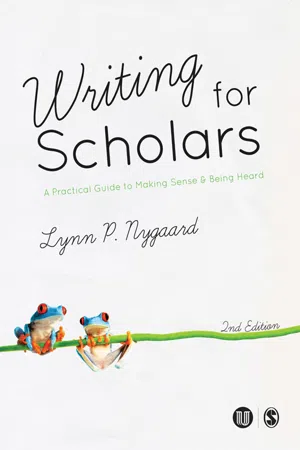
- 232 pages
- English
- ePUB (mobile friendly)
- Available on iOS & Android
About this book
Academics are not just researchers, but writers too. Using her many years of practical experience gained as a teacher and editor, Lynn Nygaard guides you through the whole process of writing and presenting your research in order to help you make your voice heard within the academic community. Grounded in real world advice rather than abstract best practice, Nygaard demonstrates a number of approaches to writing in order to help you identify those most suited to your own project.
This updated new edition includes:
- Revised and expanded sections in each chapter
- More focus on the social sciences
- A more international focus
- Updated discussions on publishing practices
- Annotated biographies for each chapter
- New illustrations and images
- Additional practical tips and exercises
From defining your audience, to forming your argument and structuring your work, this book will enable you to communicate your research passionately and professionally.
Lynn Nygaard is Special Adviser on Project Development and Publications at the Peace Research Institute Oslo (PRIO).
This updated new edition includes:
- Revised and expanded sections in each chapter
- More focus on the social sciences
- A more international focus
- Updated discussions on publishing practices
- Annotated bibliographies for each chapter
- New illustrations and images
- Additional practical tips and exercises
From defining your audience, to forming your argument and structuring your work, this book will enable you to communicate your research passionately and professionally.
Frequently asked questions
- Essential is ideal for learners and professionals who enjoy exploring a wide range of subjects. Access the Essential Library with 800,000+ trusted titles and best-sellers across business, personal growth, and the humanities. Includes unlimited reading time and Standard Read Aloud voice.
- Complete: Perfect for advanced learners and researchers needing full, unrestricted access. Unlock 1.4M+ books across hundreds of subjects, including academic and specialized titles. The Complete Plan also includes advanced features like Premium Read Aloud and Research Assistant.
Please note we cannot support devices running on iOS 13 and Android 7 or earlier. Learn more about using the app.
Information
Index
- abstracts, 103–104
- academic discourse. See scholarly dialogue (academic discourse)
- academic journals, 4–5, 69–77, 69. See also author guidelines; peer review
- academic publishing, 4. See also peer review
- academic quality, 10, 11–12
- actio, 163
- active listening, 152–153
- active reading, 150–151
- analytical research questions, 84
- anthropomorphism, 52–53
- APA author–date system, 193
- applied research, 9, 207
- argument
- in presentations, 166–169
- in multiple arguments, 93–94
- scholarly argument and rhetoric, 54–56
- argumentatio (argument), 56
- assumptions, 56, 62–69
- audience
- academic journals as, 69–77, 69
- as hostile, 62, 65–69, 208
- introduction and, 106
- knowledge dimension and, 61–62
- presentations and, 163–165
- scholarly dialogue and, 3–4
- titles and, 124–125
- types of, 1–2, 59–61, 61
- value dimension and, 62–65, 66–67
- author–date system (Harvard, APA), 193
- author guidelines
- checklist for, 200
- copy-editors and, 198–200
- on formatting, 188–189
- house styles and, 189–191
- role and importance of, 72, 185–187, 196–197
- submission process and, 200–201
- on word limits, 187–188
- See also references
- background
- in classical rhetoric, 55
- in introduction, 104–108
- in presentation, 171
- level of detai...
Table of contents
- Cover
- Half Title
- Publisher Note
- Title Page
- Copyright Page
- Contents
- Illustration List
- About the author
- Preface
- Acknowledgements
- Companion website
- One Introduction Entering the conversation
- Two Getting started Developing good writing habits
- Three The ‘I’ in (social) science Objectivity, transparency and argument
- Four Who are you talking to? Defining your audience
- Five What do you want to say? Forming your core argument
- Six How are you going to say it? Developing your structure
- Seven Breaking up the grey mass Headings, figures and tables
- Eight Holding up the mirror Giving and receiving feedback
- Nine Saying it out loud Presenting your paper
- Ten Delivering the goods Following author guidelines and submitting your manuscript
- Postscript
- Glossary
- Index